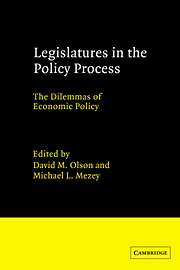Book contents
- Frontmatter
- Contents
- List of contributors
- Preface
- Acknowledgments
- PART I INTRODUCTION
- PART II MACROECONOMIC POLICY
- PART III MICROECONOMIC POLICY
- 5 The British House of Commons and industrial policy
- 6 Congress and the development of a computer industry policy in Brazil
- 7 Electronics policy and the Indian parliament
- 8 The Polish parliament and labor legislation during Solidarity
- PART IV CONCLUSION
- Name index
- General index
5 - The British House of Commons and industrial policy
Published online by Cambridge University Press: 03 March 2010
- Frontmatter
- Contents
- List of contributors
- Preface
- Acknowledgments
- PART I INTRODUCTION
- PART II MACROECONOMIC POLICY
- PART III MICROECONOMIC POLICY
- 5 The British House of Commons and industrial policy
- 6 Congress and the development of a computer industry policy in Brazil
- 7 Electronics policy and the Indian parliament
- 8 The Polish parliament and labor legislation during Solidarity
- PART IV CONCLUSION
- Name index
- General index
Summary
In Britain, as in many other countries, the process of policy-making is executive-dominated. The literature is voluminous and essentially unanimous in relegating the British parliament to a secondary role in economic policy-making (e.g. Richardson and Jordan, 1979; Coombes and Walkland, 1980; Rose, 1982). However, there is a minority view which, while accepting the central premise, insists upon the potential of the legislative arena to generate considerable influence over this executive dominated process (Norton, 1981; Schwarz, 1980; Rasmussen, 1984). Here the focus is on the backbench members of parliament (MPs), who, when acting in sufficient numbers, can thwart or deflect government policies, especially through their ability to withhold support when the House of Commons divides to vote. Regarding the separate policy-making stages, identified in this book as gestation, policy preparation, policy deliberation and decision, and policy implementation, back-bench MPs may have influence if their voices add up to a considerable volume in favor of action in one direction or another. However, there is consensus in the literature concerning the negligible role in policy-making of the individual back-bench MP. This essay will support the minority view, while according somewhat greater importance to the role of the individual MP in industrial policy implementation.
The extent to which MPs are able or motivated to participate at the various stages of policy-making will vary according to the nature of the issues being addressed.
- Type
- Chapter
- Information
- Legislatures in the Policy ProcessThe Dilemmas of Economic Policy, pp. 103 - 129Publisher: Cambridge University PressPrint publication year: 1991
- 3
- Cited by

